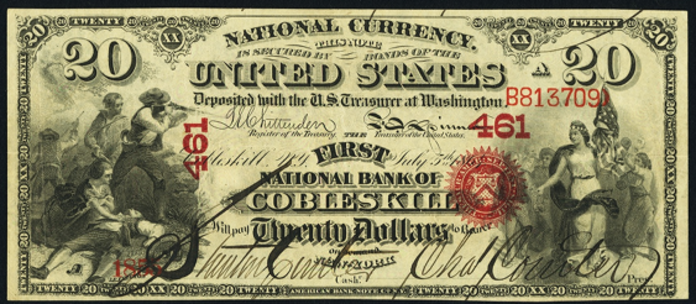Twenty Dollar Notes › Nationals › 1863 Twenty Dollar Original Series National Bank Notes › Kentucky Charters › 1863 $20 Lexington Kentucky First National Bank
Get Value Now
| Item | Info |
|---|---|
| Series | 1863 |
| Charter | #760 First National Bank of Lexington, Kentucky |
| Year Chartered | 1865, 944 Banks Chartered |
| City Info | Lexington, consolidated with Fayette County and often denoted as Lexington-Fayette, is the second-largest city in Kentucky and the 60th largest in the United States. Known as the "Horse Capital of the World", it is the heart of the state's Bluegrass region. With a mayor-alderman form of government, it is one of two cities in Kentucky designated by the state as first-class; the other is the state's largest city of Louisville. In the 2016 U.S. Census Estimate, the city's population was 318,449, anchoring a metropolitan area of 506,751 people and a combined statistical area of 723,849 people. Source: Wikipedia |
| Similar Cities | If your note doesn't match try: 1. Lexington, Kentucky - First and City National Bank 2. Lexington, Kentucky - Fayette National Bank 3. New Lexington, Ohio - First National Bank |
| Seal Varieties | Red with rays |
| See Also | If your note doesn't match try: 1. 1861 $20 Demand Note 2. 1864 $20 Compound Interest Treasury Note 3. 1863 $20 Compound Interest Treasury Note 4. 1863 $20 Gold Certificate 5. 1864 $20 Interest Bearing Note 6. 1863 $20 Interest Bearing Note 7. 1862 $20 Legal Tender |
| Other Info | 1. Value depends on notes known for charter, condition and market demand. |
| Neat Fact | Issued in sheets of 4 Notes: 3 $10 Notes, 1 $20 Note. Also 4 $10 Notes. Less commonly other combinations (Friedbergs, 20th Ed. P105) |
No Obligations Offers and Appraisals
Please submit a good photo or scan. It will be identified and evaluated. Understand there may be subtle differences between the image you see above and your note. Signatures, design, markings and note condition will determine the offer price. Notes in Uncirculated or better condition receive the best offers.
Appraisals can be estimated for wholesale and retail prices. Wholesale is what dealers typically pay. Retail is what a collector might pay. Retail is slightly higher in most cases.
Please visit this page for USA Paper Money Reference. Do not treat this page as a reference guide, it is for appraisal and acquisition purposes only.
